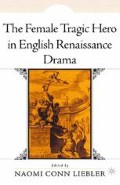Abstract
Tragedy has often been defined as a representation of the struggle between the individual and the community. Opinions have varied about whether audiences tend to side with the individual or the community. The question is of particular interest in the Renaissance because of what seems to be growing recognition of the individual and a growing imagination of identity apart from the community.1 As this sense of separate identity grows, there also develops in the drama at least the illusion of a subjectivity defined by the perception of an individuality of character. This illusion of subjectivity is particularly powerful, of course, with the male characters who are the focus of the tragedies.
Access this chapter
Tax calculation will be finalised at checkout
Purchases are for personal use only
Preview
Unable to display preview. Download preview PDF.
Editor information
Copyright information
© 2002 Naomi Conn Liebler
About this chapter
Cite this chapter
Roberts, J.A. (2002). Sex and the Female Tragic Hero. In: Liebler, N.C. (eds) The Female Tragic Hero in English Renaissance Drama. Palgrave Macmillan, New York. https://doi.org/10.1007/978-1-137-04957-5_10
Download citation
DOI: https://doi.org/10.1007/978-1-137-04957-5_10
Publisher Name: Palgrave Macmillan, New York
Print ISBN: 978-1-349-62150-7
Online ISBN: 978-1-137-04957-5
eBook Packages: Palgrave Literature & Performing Arts CollectionLiterature, Cultural and Media Studies (R0)

